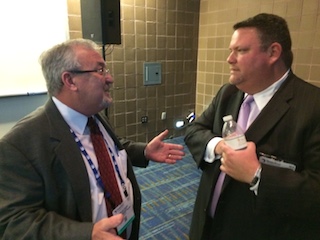A new report by Louisiana business and vocational training experts says 3,000 more trained maritime professionals will be needed along the state's waterways in the next few years. The problem is many more are already headed for the exits.
Most workers in the offshore service sector and related fields now have at least 10 to 20 years' experience, "and 50 percent of those people are retiring in the next 10 years," warned Eric Peters, Americas managing director for the Faststream Recruitment Group, one of the biggest hiring sources for finding skilled workers for the maritime trades.
"We have got to get some dialogue going, because we've got some real problems coming in this industry,...There's a lack of talent," Peters told an audience Tuesday at the WorkBoat Maintenance & Repair Conference and Expo in New Orleans.
For all the bad news about energy industry job layoffs because of lower oil prices, there's another effect of the remaining workers getting more tasks piled on, said Peters, a Louisiana native with long industry connections on the Gulf coast.
"There's absolute burnout. Whatever the price of oil is ... the good people are staying on, and being asked to do even more," he said. "Burnout is coming harder since Christmas than we've ever seen."
The industry's problems with attracting and training younger welders, pipe fitters, mechanics, mariners and others have been growing for years. There's renewed urgency with the prospect of the federal government offering new offshore energy exploration leases. Virginia political and business leaders want to position their state to take a lead role, but there are already labor shortages to supply existing shipbuilding and shoreside support businesses.
"Welding is a very competitive thing out there in the shipbuilding world," said Ken Johnson, lead faculty and welding director for Vigor Industrial, which first teamed with South Seattle College in 2013 to recruit and train more new welders.
That project has been featured in WorkBoat, and so far its graduates have achieved a 80% employment rate, with an average $21.93 an hour starting wage. Some 52% of the students have come in while using state unemployment insurance, said Veronica Wade, the college dean of workforce education.
The need is coming big time to the Gulf coast, Peters said.
"They need 3,000 welders in Lake Charles (La.) in the next three years. Where are these people going to come from?" he said. The most aggressive companies are offering bigger retention bonuses, and for offshore workers, new work schedules up to 30 days on/30 days off, he said.
There is a big generational shift too, with younger workers looking for newer ships, better accommodations with recreation and fitness opportunities. And of course, keeping connected with friends and family with Internet connections at sea and social media, Peters said.
"Clearly colleges are going to be the key" with more vocational-technical training at the community college level, Peters said. "It's got to start with scholarships, it's got to come in curriculum changes."
In New Orleans, Delgado Community College has been trying, but needs more help from the industry itself, said Delgado's Sterling Dolese, a former shipyard director for Northrop Grumman.
"We cannot teach to the next level of workers if we don't get who we need," said Dolese, who is searching for adjunct instructors who can teach part-time.
Doles got to now lots of people in the industry When he was helping build Navy ships. But now, he says, "I call, and I get hung up on. I feel like a telemarketer."
"It's got to be more of a discussion on the national level," Peters said. Without some major progress, workforce numbers "will fall off a cliff 24 months from now" as final retirements happen, he said.
The WorkBoat Maintenance & Repair Conference and Expo continues today through Thursday in New Orleans.




